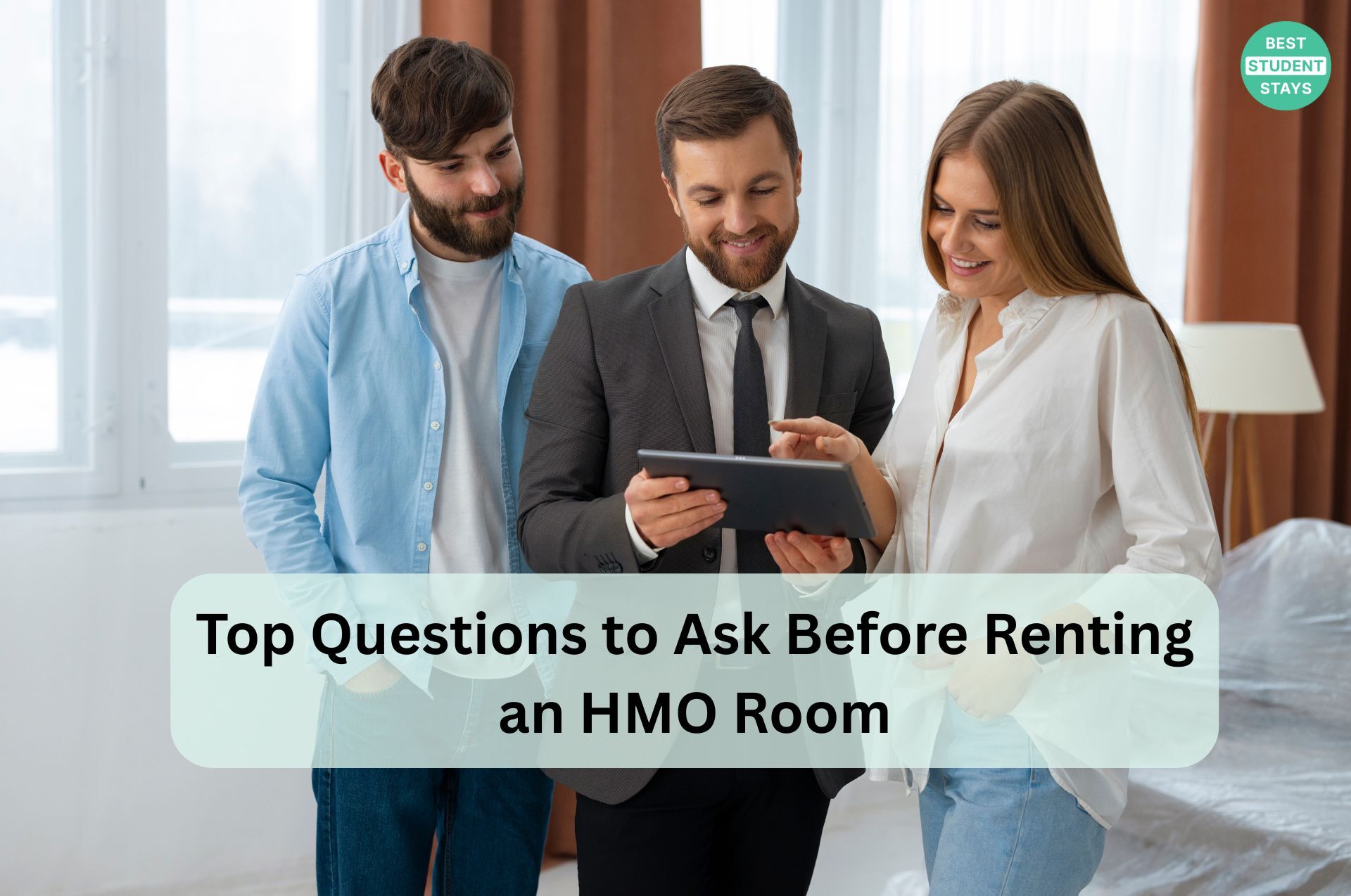TL;DR
HMO house rules cover cleanliness, noise, guests, and payments to ensure harmonious shared living. Common policies include quiet hours (usually 10pm-8am), guest limits (2-3 nights max), cleaning rotas, and rent payment deadlines. Understanding these rules prevents conflicts and potential eviction. Always read your tenancy agreement thoroughly and know your rights as a tenant.
Last month, my mate Jake nearly got kicked out of his HMO because he didn't understand one simple house rule about overnight guests. Turns out his landlord had a strict "maximum 3 consecutive nights" policy that Jake completely missed in his tenancy agreement.
This isn't unusual. Most students sign HMO contracts without fully understanding the house rules, then find themselves in sticky situations later. I've been helping students navigate shared accommodation for three years now, and trust me - knowing these rules inside out can save you from major headaches.
What Are HMO House Rules Actually About?
HMO house rules aren't just random restrictions landlords made up to annoy you. They're designed to make shared living work smoothly when you've got 4-6 people sharing kitchens, bathrooms, and living spaces.
Think about it - without clear guidelines, you'd have chaos. Who cleans what? When is too late for music? Can your boyfriend stay over every night? These rules answer those questions before they become arguments.
House rules typically cover five main areas:
-
Cleanliness and maintenance responsibilities
-
Noise levels and quiet hours
-
Guest and overnight visitor policies
-
Rent payment procedures and deadlines
-
Safety and security protocols
The key thing to remember? These rules are legally binding once you sign your tenancy agreement. Ignoring them can lead to warnings, fines, or even eviction.
The Most Common HMO House Rules Explained
Let me break down the standard rules you'll encounter in most student HMOs across the UK.
Cleanliness and Maintenance Rules
Kitchen cleanliness policies:
-
Wash up immediately after cooking (within 2 hours maximum)
-
Clean surfaces and hob after use
-
Weekly deep clean rotation among housemates
-
No dirty dishes left overnight in sink
-
Empty bins when full (usually rotating weekly duty)
Bathroom maintenance:
-
Clean after use (wipe down shower, sink)
-
Weekly deep clean roster
-
Report any maintenance issues immediately
-
No personal items left permanently in shared bathrooms
Common area responsibilities:
-
Vacuum living areas weekly (rotating responsibility)
-
Keep hallways clear of personal items
-
No personal belongings in shared spaces
-
Report any damage or maintenance needs
Noise Level Guidelines
Most HMOs have specific quiet hours, typically:
-
Weekdays: 10pm - 8am quiet period
-
Weekends: 11pm - 9am quiet period
-
Study periods: Extended quiet hours during exam seasons
What counts as noise violations:
-
Loud music or TV after quiet hours
-
Excessive talking or laughing in corridors
-
Slamming doors repeatedly
-
Heavy footsteps in upper floor rooms
My friend Sarah learned this the hard way when she got a formal warning for having her TV too loud at 11pm on a Tuesday. The noise rule seemed reasonable until she realized how thin the walls were.
Guest and Overnight Visitor Policies
This is where most students get caught out. Typical guest policies include:
|
Policy Area |
Common Rules |
|
Overnight stays |
Maximum 2-3 consecutive nights |
|
Monthly limits |
No more than 10 nights per month |
|
Guest responsibilities |
Visitors must follow all house rules |
|
Registration |
Inform housemates and/or landlord in advance |
|
Key access |
Guests cannot have copies of house keys |
Real example: Tom's HMO allowed guests for "occasional overnight stays" but didn't define "occasional." When his girlfriend stayed 4 nights a week for two months, he received an eviction notice. The landlord interpreted "occasional" as less frequent than Tom expected.
Rent Payment Procedures
Standard payment rules:
-
Due date (usually 1st of each month)
-
Payment method (bank transfer, standing order)
-
Late payment charges (typically £25-50 after 7 days)
-
Consequences of missed payments
-
How to communicate payment issues
Bills and utilities:
-
Whether utilities are included in rent
-
How additional charges are calculated
-
Responsibility for setting up accounts
-
Usage monitoring and fair use policies
Safety and Security Protocols
Essential security rules:
-
Always lock front door when leaving
-
Don't give keys to non-residents
-
Report lost keys immediately
-
Close windows when leaving property
-
Don't leave valuable items in common areas
Fire safety requirements:
-
Keep fire escape routes clear
-
Regular fire alarm testing (usually monthly)
-
No smoking inside the property
-
Proper use of kitchen appliances
-
Reporting any fire safety concerns
Understanding Your Rights vs Responsibilities
Here's something most students don't realize - not every "house rule" is legally enforceable. You have rights as a tenant that can't be overridden by arbitrary policies.
What Landlords CAN Enforce
Legally binding rules typically include:
-
Basic property maintenance and cleanliness
-
Reasonable noise restrictions
-
Guest policies that prevent overcrowding
-
Rent payment terms and procedures
-
Safety and security measures
What Landlords CANNOT Enforce
Unreasonable restrictions include:
-
Banning all guests completely
-
Excessive cleaning demands beyond normal wear
-
Charging for minor maintenance issues
-
Restricting access to facilities you're paying for
-
Changing rules mid-tenancy without proper notice
Red flag example: One student told me her landlord tried to charge £50 for "excessive showering" because she used hot water daily. This isn't enforceable - reasonable use of facilities is your right.
Your Responsibilities as a Tenant
You're required to:
-
Follow reasonable house rules outlined in your agreement
-
Keep your room and shared areas reasonably clean
-
Respect other tenants' right to quiet enjoyment
-
Pay rent and bills on time
-
Report maintenance issues promptly
-
Allow necessary property inspections with proper notice
Read Also: Understanding your Rights as a HMO Tenant in the UK
Handling Rule Violations and Disputes
When house rules get broken - and they will - knowing how to handle situations diplomatically can save relationships and avoid escalation.
Minor Violations (Handle Internally)
Common minor issues:
-
Leaving dishes in the sink occasionally
-
Playing music slightly too loud
-
Forgetting to clean shared areas
-
Having guests stay one night too many
How to address diplomatically:
-
Have a friendly house chat
-
Send a polite group message
-
Suggest solutions rather than complaints
-
Give benefit of the doubt for first-time offenses
Serious Violations (May Need Landlord Involvement)
Serious breaches include:
-
Consistently ignoring cleaning responsibilities
-
Regular noise violations affecting others' sleep/study
-
Unauthorized long-term guests
-
Damage to property
-
Threatening or aggressive behavior
Steps to take:
-
Document the issue (photos, dates, communications)
-
Attempt direct resolution first
-
Inform landlord or property manager
-
Keep records of all communications
-
Know your options for mediation or complaint procedures
When Rules Are Unfair or Illegal
Sometimes landlords create unreasonable rules. Here's how to handle it:
First steps:
-
Check your tenancy agreement carefully
-
Research local tenant rights
-
Contact your university's accommodation office
-
Seek advice from Shelter or Citizens Advice
Example resolution: My friend's landlord tried to ban all cooking after 8pm. After checking tenant rights, she discovered this violated her right to reasonable use of facilities. The rule was withdrawn after she presented evidence from Citizens Advice.
Red Flags: Unreasonable House Rules to Avoid
Some HMO house rules cross the line from reasonable to exploitative. Watch out for these warning signs:
Excessive Control Measures
Unreasonable restrictions:
-
Banning guests entirely
-
Requiring permission for basic activities
-
Excessive inspection frequency (more than quarterly)
-
Controlling heating/electricity usage beyond reasonable limits
-
Restricting access to facilities during normal hours
Financial Exploitation
Dodgy charging policies:
-
Charges for normal wear and tear
-
Excessive cleaning fees for minor issues
-
Penalty charges for reasonable facility usage
-
Demanding cash payments only
-
Changing financial terms mid-tenancy
Privacy Violations
Inappropriate monitoring:
-
Excessive CCTV in common areas
-
Entering rooms without proper notice
-
Monitoring personal activities
-
Requiring detailed guest information
-
Restricting personal decorations in private rooms
Tips for Successful HMO Living
After helping dozens of students navigate HMO rules, here are my top tips for making shared living work:
Before You Sign
Research thoroughly:
-
Read the entire tenancy agreement
-
Ask specific questions about unclear rules
-
Visit during evening hours to assess noise levels
-
Talk to current tenants about their experiences
-
Check online reviews and ratings
Setting Expectations Early
First week priorities:
-
Introduce yourself properly to all housemates
-
Discuss cleaning schedules and preferences
-
Exchange contact information
-
Clarify any confusing house rules
-
Establish friendly communication channels
Maintaining Good Relationships
Long-term success strategies:
-
Be proactive about cleaning and maintenance
-
Communicate openly about any issues
-
Show consideration for others' schedules and needs
-
Participate in house meetings or discussions
-
Remember that compromise goes both ways
Documentation and Protection
Protect yourself legally:
-
Keep copies of all agreements and communications
-
Document the property condition on move-in
-
Save receipts for any damages you didn't cause
-
Know who to contact for different types of issues
-
Understand your deposit protection rights
Read Also: Benefits of Renting a HMO for Students
Regional Variations in HMO Rules
HMO policies can vary significantly depending on where you're studying in the UK.
London Specifics
Common London HMO rules:
-
Stricter guest policies due to space constraints
-
Higher penalty charges for rule violations
-
More detailed noise restrictions
-
Specific rules about package deliveries and storage
Northern Cities (Manchester, Leeds, Newcastle)
Typical characteristics:
-
More relaxed guest policies
-
Lower financial penalties
-
Greater emphasis on heating and energy usage
-
Community-focused rules for shared areas
University Towns (Bath, Durham, St Andrews)
Common features:
-
Term-time specific rules
-
Accommodation for holiday periods
-
Integration with university policies
-
Student-focused dispute resolution procedures
Modern Challenges: Digital Age HMO Rules
Today's HMO house rules increasingly address technology and digital living:
Internet and Technology Policies
Common digital rules:
-
Fair usage policies for shared internet
-
WiFi password sharing protocols
-
Streaming service account sharing guidelines
-
Gaming and bandwidth-heavy activity restrictions
Social Media and Privacy
Emerging considerations:
-
Photo/video posting permissions for shared spaces
-
Social media complaints about property or housemates
-
Online review policies
-
Digital communication preferences for house matters
Smart Home Technology
New rule areas:
-
Smart lock and entry system usage
-
Voice assistant privacy in shared spaces
-
App-based utility monitoring and reporting
-
Digital maintenance request procedures
Crisis Management: When Things Go Wrong
Despite best efforts, sometimes HMO living situations break down. Here's how to handle crisis situations:
Escalation Procedures
When internal resolution fails:
-
Documentation: Keep detailed records of all issues
-
Mediation: Request landlord or property manager intervention
-
External help: Contact university accommodation services
-
Legal advice: Consult Shelter, Citizens Advice, or legal aid
-
Last resort: Consider breaking tenancy with proper legal guidance
Emergency Situations
Immediate safety concerns:
-
Contact emergency services if anyone is in danger
-
Report serious property damage immediately
-
Document everything with photos and written records
-
Inform landlord and university accommodation office
-
Know your rights regarding emergency accommodation
Financial Protection
Protecting your money:
-
Understand deposit protection schemes
-
Keep receipts for personal property damage
-
Document any overcharges or unfair fees
-
Know the process for deposit disputes
-
Consider contents insurance for valuable items
Future-Proofing Your HMO Experience
As student accommodation evolves, so do house rules and policies. Here's what to expect:
Emerging Trends
New rule areas developing:
-
Environmental responsibility and sustainability
-
Mental health and wellbeing considerations
-
Flexible living arrangements for hybrid study
-
Community building and social integration
-
Technology integration and digital communication
Preparing for Change
Stay adaptable:
-
Keep informed about tenant rights updates
-
Maintain open communication with landlords
-
Participate in policy discussions when possible
-
Share feedback constructively
-
Build positive relationships that survive rule changes
Making the Right Choice
Finding an HMO with reasonable, fair house rules is crucial for your university experience. Here's your action plan:
Before Viewing Properties
Preparation checklist:
-
List your non-negotiable requirements
-
Research typical rules in your target area
-
Prepare questions about specific policies
-
Set a realistic budget including potential penalty charges
-
Know your rights and responsibilities as a tenant
During Property Visits
Key questions to ask:
-
Can you see the full house rules document?
-
How are disputes typically resolved?
-
What's the track record with previous tenants?
-
Are there any recent rule changes?
-
How flexible are policies for reasonable requests?
Making Your Decision
Final considerations:
-
Do the rules seem fair and reasonable?
-
Can you realistically follow all requirements?
-
Are housemates likely to be compatible?
-
Is the landlord responsive and professional?
-
Does the property feel like somewhere you can call home?
Read Also: HMOs vs Uni Halls vs PBSAs
Your Rights and Resources
Remember, you're not powerless in HMO situations. Here are your key resources:
Essential Contacts
Keep these numbers handy:
-
Your university accommodation office
-
Local Citizens Advice Bureau
-
Shelter housing charity helpline
-
Your landlord or property manager
-
Local council housing department
Online Resources
Useful websites:
-
Shelter.org.uk for housing rights
-
Gov.uk for official tenant information
-
Your university's student portal
-
Local council websites for area-specific rules
-
Student forums for peer experiences
Legal Protection
Know your options:
-
Tenancy deposit protection schemes
-
Legal aid for serious disputes
-
University student support services
-
Professional mediation services
-
Small claims court for financial disputes
Conclusion: Making HMO Living Work
Understanding HMO house rules isn't about following every tiny detail perfectly - it's about creating a living situation that works for everyone. The best shared houses are those where housemates communicate openly, show mutual respect, and work together when problems arise.
Remember Jake from the beginning? After nearly getting evicted over the guest policy, he learned to ask questions upfront and communicate clearly with his housemates. His second HMO experience was completely different - he even became close friends with his housemates because they established good communication from day one.
The key is being proactive rather than reactive. Read your agreement thoroughly, ask questions when things are unclear, and treat your housemates with the same consideration you'd want from them.
Most landlords and housemates are reasonable people who just want a peaceful living environment. By understanding the rules, knowing your rights, and approaching shared living with a positive attitude, you'll set yourself up for a great university accommodation experience.
Don't let fear of house rules put you off HMO living - many students find it's the best way to make lasting friendships while keeping accommodation costs manageable. Just go in prepared, stay informed, and remember that communication is always better than conflict.
Looking for HMO accommodation with fair, transparent house rules? Browse verified student properties with clear policies and responsive landlords at Best Student Stays - where finding quality shared accommodation is straightforward and stress-free.



